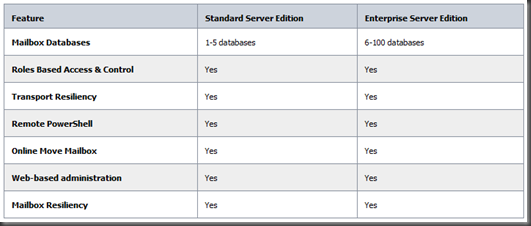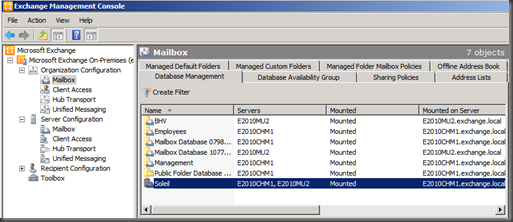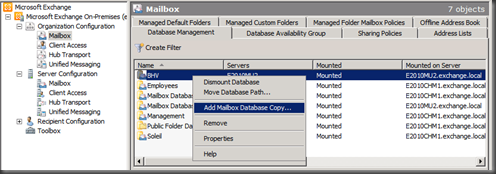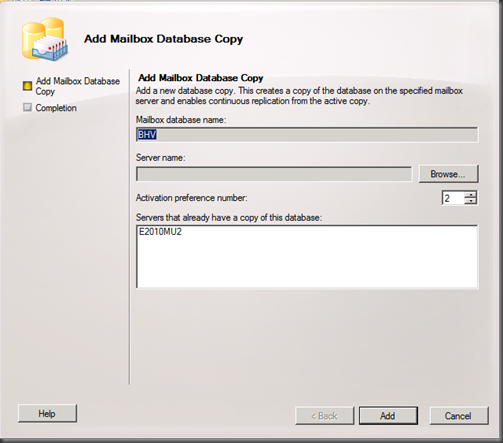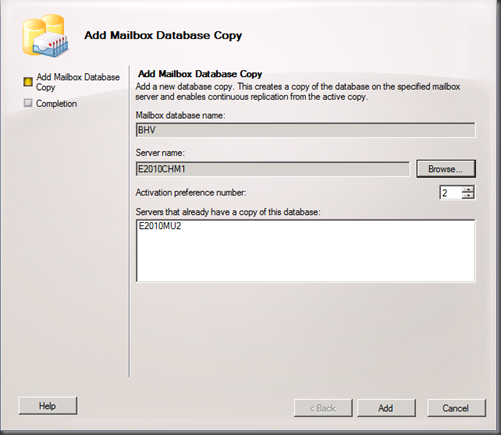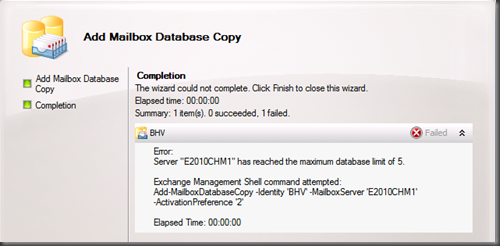Exchange 2010 Standard edition limited to 5 databases
When talking about the new High Availability features in Exchange 2010 an often recurring question is “How many mailbox databases can you home on an Exchange 2010 Standard Edition?”
The answer is listed here: Looking at the On-Premise Licensing for Exchange Server 2010, and for a Standard Edition you are limited to 5 and for an Enterprise edition you are limited to 100:
The next question is a lot of times: does this apply to active mailbox databases only?
Let’s see…
I’ve got a DAG, called DAG1, which includes two servers: E2010CHM1, and E2010MU2. I’ve created a few mailbox databases as you can see in the picture below:
The following databases are mounted on E2010CHM1:
- Employees
- Mailbox Database 0789…
- Management
- Soleil
- Public Folder Database
And the following mailbox databases are mounted on E2010MU2:
- BHV
- Mailbox Database 1077…
Now let’s try to add a mailbox database copy for the mailbox database BHV, so it will be available as a passive database copy on E2010CHM1.
Here’s the result:
Conclusion
Exchange 2010 Standard Edition is limited to a maximum database limit of 5 (which is the sum of active and passive database copies, and the public folder database!)
Ilse
Comments
Anonymous
January 01, 2003
I have a question that is related - 2 Std edition with 5 databases each - 2 Active - 2 passive and 1 PF each (5 DB per server) what about adding a 3rd Enterprise server and creating a 3rd copy of each database on the enterprise. I am virtually sure this is fine as the Ent server is not attempting to copy anything back to either std servers.Anonymous
January 01, 2003
The comment has been removedAnonymous
January 01, 2003
Good article! An important side note - you must use Windows 2008 ENTERPRISE to utilize DAG.Anonymous
October 09, 2010
And what about Personal Archive databases in SP1? Five databases is the limit for the sum of active, passive, public folder and personal archive databases?Anonymous
November 09, 2010
So, if i got it right, there is a limit of 5 databases per server. Does that mean that if you had tried to add the copy to the other server (the one with only 2 databases) would it have been successful? Regards.Anonymous
November 17, 2011
NOPE !!! FAIL!!! 5 Databases PER Server !!! look here: technet.microsoft.com/.../bb232170.aspx In Your Scenario you already have 5 Databases on E2010CHM1 !!! whackmannAnonymous
July 22, 2012
It looks like the 'Soleil' db is already part of a DAG(?) Also, if you had attempted to add 'Employees' to your DAG would it have worked (since server 2 has less than 5 databases)?Anonymous
February 26, 2013
I have a question, if I have standard edition of exchange 2010 how many user mailboxes can I create? thanks.Anonymous
May 10, 2014
Pingback from Exchange 2013 SP1 – Pré-Requisitos de S.O | MSITPRO – Unified CommunicationsAnonymous
May 10, 2014
Pingback from Exchange 2013 SP1 – Pré-Requisitos de S.O | MSITPRO – Unified CommunicationsAnonymous
May 20, 2014
Pingback from Exchange 2013 SP1 – Pré-Requisitos de S.O | MSITPRO – Unified CommunicationsAnonymous
May 26, 2014
Hi guys:
I got a question about licensing Exchange into a specific scenario.
Here´s my story:
My company has 4 mailbox servers running on EXchange 2010 Enterprise.
We are moving to DAG configuration, from microsoft website we know that Enterprise version can support up to 100 databases (Active, passive and public folder).
Since we have 4 instances running with Exchange 2010 Enterprise, and as we know this version support up to 100 databases , does that mean that my environment could have 400 databases as maximum?Anonymous
December 03, 2015
The comment has been removedAnonymous
February 24, 2016
Very precise article!
